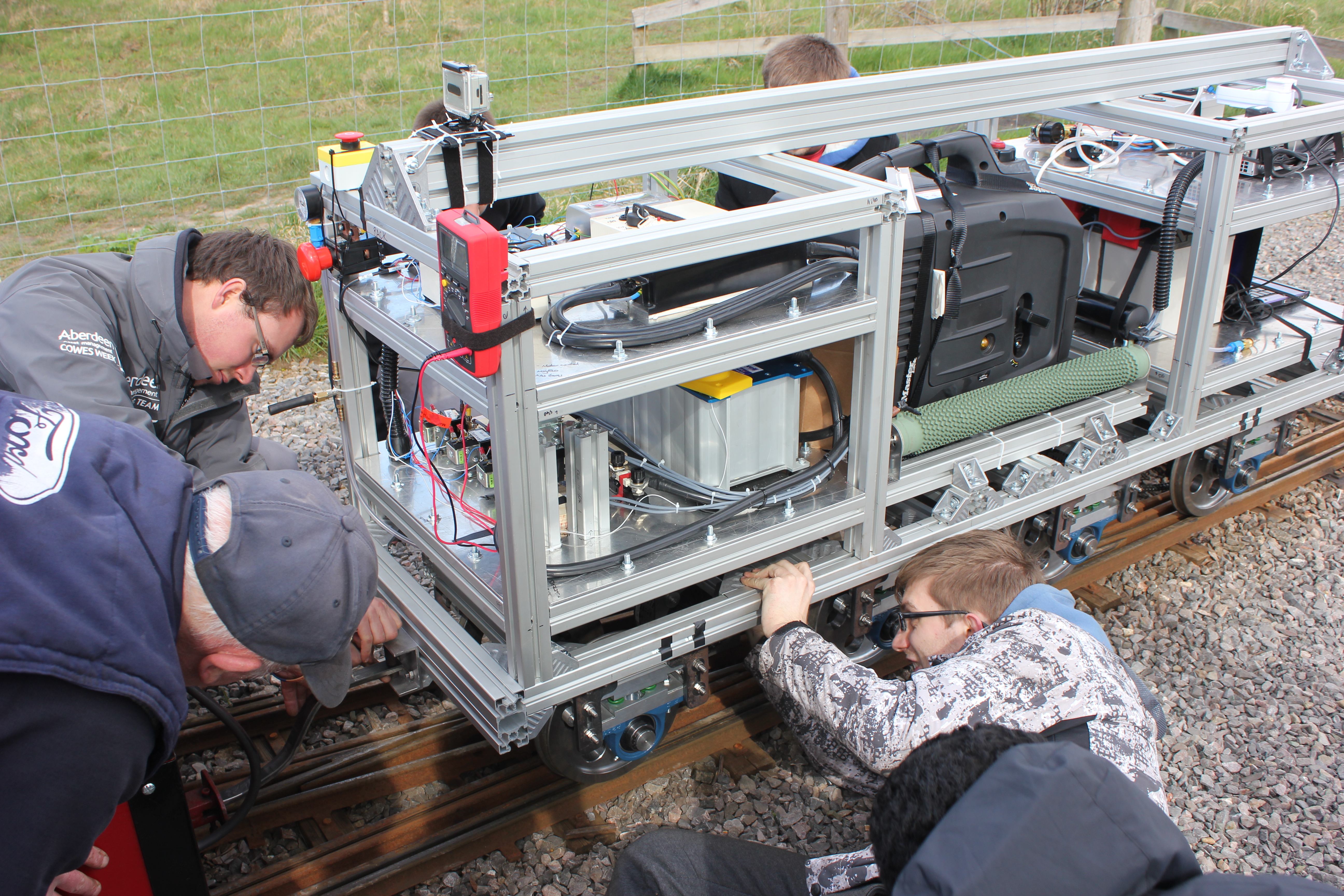A team of 12 students from Southampton University are gearing up to compete at the Institution of Mechanical Engineers’ Railway Challenge, taking place in June at the Stapleford Miniature Railway near Melton Mowbray, Leicestershire.
The students will be pitting themselves against seven other teams to design and manufacture the best, most efficient and quietest small-scale locomotive.
Ahead of the competition, the Southampton University team has already won £1,500 in funding from the Institution for the Best Application from a new team, funding which is being used to help the team prepare their 2015 project.
The Southampton team has already successfully tested the locomotive at the nearby Eastleigh Lakeside Miniature Railway. Pictures of the testing day are courtesy of Peter Nixon.
 The project has been run as a final year Group Design Project which is a core module run by the University of Southampton in the final year of the Mechanical Engineering course. Group Design Projects allow students the chance to apply their knowledge and gain useful, practical skills which can be used in the future.
The project has been run as a final year Group Design Project which is a core module run by the University of Southampton in the final year of the Mechanical Engineering course. Group Design Projects allow students the chance to apply their knowledge and gain useful, practical skills which can be used in the future.
The competition will see teams compete against each other to design and manufacture the best, most efficient and quietest small-scale locomotive. The teams competing against Southampton University this year are: Birmingham University, Huddersfield University (who won the competition in 2013), Interfleet (based in Derby, who won in 2012), Sheffield University, Swindon’s TE Connectivity, Transport for London (who were last year’s winners) and Warwick Manufacturing Group (part of the University of Warwick).
The competition comprises of two presentation challenges, one of which is the submission of a design report and the other being a business case presentation, and six track based challenges which will be decided over the weekend. These include: energy storage, traction, ride comfort, noise and new for the 2015 competition maintainability and energy efficiency.
Philippa Oldham, Head of Transport and Manufacturing at the Institution of Mechanical Engineers, said:
“The Railway Challenge gives competitors a fantastic chance to test their engineering skills and get the hands-on experience of what’s needed to make a locomotive from start to finish.
“The competition is run along the lines of a real-life tendering process, and teams have to prepare a business case, finance, design, and build a locomotive from scratch.
“I’m looking forward to seeing the new innovations in this year’s locomotives, particularly the solutions that are being proposed for both the energy storage and energy efficiency challenges. These are two big issues currently being faced by manufacturers and the solutions these young engineers have developed as part of this competition could one day revolutionise modern railways.
“This year looks set to be a tight contest, with more teams than ever and three previous winners taking part.”
Mitchell Clark, Project Lead and Final Year Mechanical Engineering Student at the University of Southampton, said:
“As a first-time team entry of final year Mechanical Engineering students we have had the opportunity to apply engineering principles and industrial experience to such a practical project, resulting in a functional miniature locomotive.
“We have been incredibly fortunate in receiving support from the Engineering and the Environment faculty at the University of Southampton, our industrial sponsor Siemens and also the Institution of Mechanical Engineers.
“Initial testing at Eastleigh Lakeside Miniature Railway was a real success and the team are very much looking forward to participating in the Railway Challenge in June."
Dr Mohamed Torbati, Project Supervisor, Lecturer and Senior Research Engineer for the Electro-Mechanical Engineering Research Group at the University of Southampton, said:
“This challenge has enabled the students to bring together many of the concepts they have been learning and at the same time learn new concepts and gain new skills. The challenge has also encouraged them to execute tasks through careful planning, carry out research, and develop critical judgement and engineering competence. The new challenges that are set out by the Institution each year means that the locomotive design project can be taken on by students year after year and hence it has the potential to become an iconic project for our Mechanical Engineering program.”
The locomotives that will be competing are designed to work on 10¼” gauge railway line and must be powerful enough to transport a 600kg load – including one of the Railway Challenge judges.
The trophy will be presented to the winning team by Professor Richard Folkson, President of the Institution of Mechanical Engineers, on Sunday 28 June 2015.
The Railway Challenge will be taking place at Stapleford Miniature Railway near Melton Mowbray in Leicestershire on 26 to 28 June 2015. There are filming and photo opportunities and journalists are invited to attend on Sunday 28 June when the practical challenges will take place.
Steam hauled spectator trains will also be running on the railway.
To watch a video showing the construction and first movement of the Southampton University locomotive:
http://tinyurl.com/olylv2z